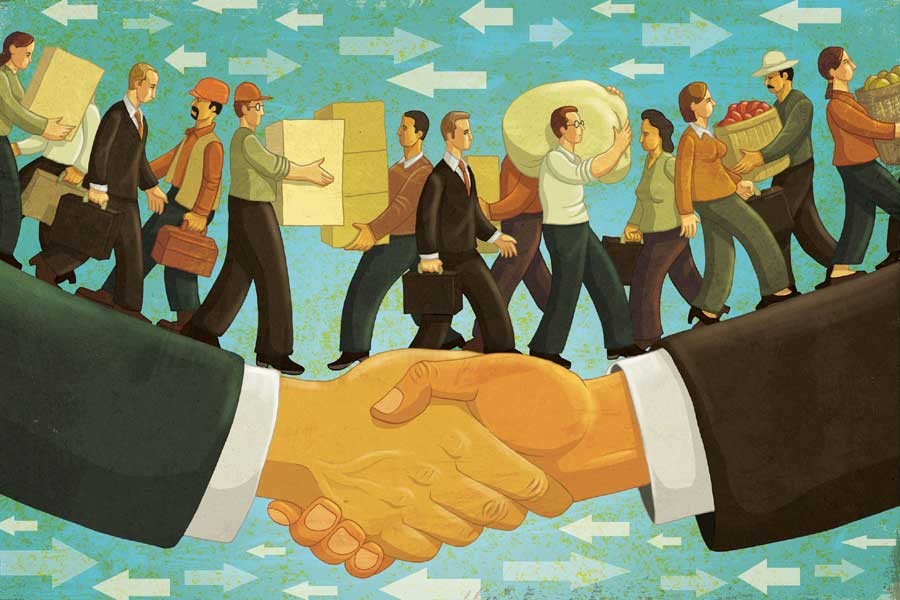For many economists, especially those trained in the orthodox neo-classical school or David Ricardo's comparative advantage, the supposed benefits from 'free trade' are an article of faith. For example, in a recent research paper, Professor Dani Rodrik of Harvard University quotes a survey of 37 leading American economists, in which almost all agreed that freer trade was better than protection against imports. (See Dani Rodrik, 'What do trade agreements do?' NBER Working Paper24344; http://papers. nber.org/tmp/24493-w24344.pdf)
What surprised Rodrik was the economists' equal certainty that the 2,000-page North America Free Trade Agreement (NAFTA) between the US, Canada and Mexico had been a great success, despite recent research findings that the deal produced miniscule net efficiency gains for the US economy. It severely depressed wages of those groups and communities most directly affected by Mexican competition.
Trade agreements, like free trade itself, create winners and losers. How can economists be so certain that the gains to the winners far exceed the losses to the losers - and that the winners have compensated the losers adequately?
Economists routinely endorse free trade agreements (FTAs) because they assume such deals are about reducing protection and making trade freer, and hence must be good overall. But the so-called FTAs are much more about such issues as regulatory standards, health and safety rules, investment, banking and finance, intellectual property, labour, the environment, state-owned-enterprises and many other subjects that are not the focus of economists' simple trade theory. International agreements in such areas produce economic consequences that are far more ambiguous than is the textbook case of lowering traditional border barriers.
Rodrik lists four components of so-called FTAs that are worrying:
Intellectual property (IP) rights. Since the early 1990s, the US has been pushing for its laws protecting patents, copyrights and trademarks to be copied and policed by other governments. The US just happens to be a huge exporter of intellectual property - in the form of pharmaceuticals, software, hardware, music, movies and much else. Tighter policing of US IP monopoly restrictions pits rich countries against poor countries.
Ability to manage cross-border capital flows. The US, with its world-dominating financial markets, always pushes for unrestricted inflows and outflows of financial capital. But a string of financial crises have convinced economists, including many orthodox believers, that it is a good thing for developing economies to retain some controls.
Investor-state dispute settlement procedures. These allow foreign investors - but not local investors - to sue host governments in special arbitration tribunals of their choice and seek damages if they see regulatory, tax and other policy changes reduce their profits, even though the changes are in national interest.
Harmonisation of regulations. It is argued that by having countries the same regulations governing protection of the environment, working conditions, food, health and safety, and so forth would make it easier for foreign investment and trade to grow. But the trouble is, there is no universal benchmark to judge whether the regulatory standard that is being harmonised with - probably America's - is good for the poor nations. In most cases, these regulatory standards are covert non-tariff barriers against developing countries' exports.
Rodrik concludes that "trade agreements are the result of rent-seeking, self-interested behaviour on the part of politically well-connected firms - international banks, pharmaceutical companies, multinational firms". They may result in greater mutually beneficial trade, but they are just as likely to redistribute income from the poor to the rich under the guise of 'freer trade'.
Many in Bangladesh were disappointed that Bangladesh was not on the gravy train of the Trans-Pacific Partnership (TPP), dubbed as the 'gold standards' to deal with issues of the 21st century. Some probably still hope for a late entry of Bangladesh now that the TPP is receiving CPR (cardiopulmonary resuscitation, a method used to keep someone alive in a medical emergency) from heroic lifesavers, such as Japanese Prime Minister, Shinz? Abe, who is seen as a friend of Bangladesh. As the charismatic Canadian Prime Minister, Justin Trudeau, finally blesses the revived TPP, some sceptics may also believe that it has to be good.
However, many do not realise that 'free trade' is a cover for dubious special deals. Politicians, who promote FTAs, want us to believe they will do wonders for 'jobs and growth'. In reality, however, they work for the business lobbyists who want to use FTAs to win concessions for their industry clients. The politicians oblige as they depend on big businesses. They try to make something virtuous just by giving it a holy name, 'free trade' when in fact it is not.
Anis Chowdhury, Adjunct Professor, Western Sydney University and the University of New South Wales (Australia), held senior United Nations positions in New York and Bangkok during 2008-2016.


